It is always striking to me how transformational becoming vegan has been. What started out as a personal campaign to improve my health and prevent disease led me to examine all areas of my life and develop incredible stewardship for animals and the environment. Veganism has truly opened my eyes.
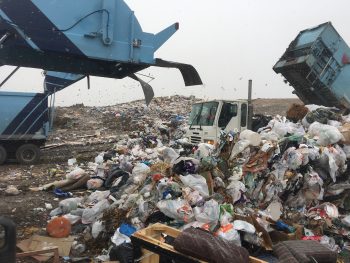
One such area has been in my relationship with garbage. I’m not going to candy-coat it: it’s pure, unadulterated trash. And guess what? — that includes recyclables too. Did you know that most of what we set out in recycling bins gets sent to the dump and is never recycled? Turns out, our recyclables were being shipped to China for processing, not even recycled in the U.S. But worse, because our recyclables are so soiled, China won’t accept them anymore, so they’re going to the dump, not recycled at all!
Even when China was taking U.S. garbage, it wasn’t really the answer. Only 9% of plastic sent overseas was recycled; the rest was dumped. Recyclable plastic can only be recycled once and is made into products that aren’t recyclable in the future, such as plastic furniture. Chinese air quality standards are not as stringent, allowing toxic processing fumes into the atmosphere. Glass, while recyclable, takes as much energy to recycle as it does to make the initial product.
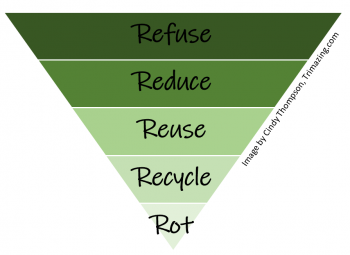 Simply setting out materials for recycling is not the answer. Zero Waste looks at other means of eliminating waste and puts recycling low on the list. Paul Palmer first coined the term “Zero Waste” in the mid-70s, but the term was not widely used until 2000. Bea Johnson of Zero Waste Home is often credited with bringing Zero Waste to the home consumer with the 5 R’s of Zero Waste: Refuse, Reduce, Reuse, Recycle, and Rot.
Simply setting out materials for recycling is not the answer. Zero Waste looks at other means of eliminating waste and puts recycling low on the list. Paul Palmer first coined the term “Zero Waste” in the mid-70s, but the term was not widely used until 2000. Bea Johnson of Zero Waste Home is often credited with bringing Zero Waste to the home consumer with the 5 R’s of Zero Waste: Refuse, Reduce, Reuse, Recycle, and Rot.
Refuse
Refuse to accept or bring in materials that create waste, things that you do not need. Don’t purchase items in non-recyclable or non-compostable packaging, or single-use items such as plastic utensils or paper cups. Note, a lot of “compostable” utensils cannot be composted by most waste management companies as they require special processes and are simply put in the dump.
Reduce
Downsize, limit yourself to the things you really do need. Resist the urge for shopping as therapy. Limit length of showers; run full laundry loads instead of multiple smaller ones; walk instead of drive; borrow books from the library or read books and newspapers online or on a personal device. Use mesh bags or your own containers to buy produce or items from bulk bins.
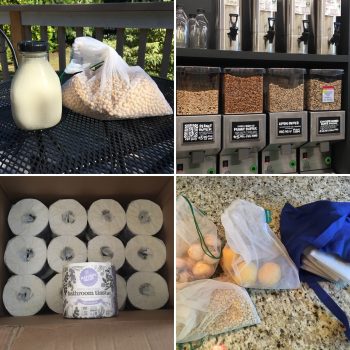
Reuse
Select things that can be reused over and over for the same or a different purpose. Employ reusable containers for food storage and serving; carry reusable beverage containers and utensils; use cloth napkins and towels instead of paper; repurpose used or worn out items; have furniture reupholstered instead of replaced.
Recycle
Choose recycled products; buy items from a secondhand store, thrift store, Craigslist, or Facebook Marketplace instead of buying new–and sell or donate your things rather than throwing them out. Use rechargeable batteries.
Rot
Compost! Build a compost bin or worm bin to create compost for your garden and landscaping or use your community yard debris/food waste pickup. Being vegan means ALL of our food waste is compostable and should never go into the garbage. Compost paper napkins and towels (until you replace with cloth), bamboo toothbrushes (except the bristles, which need to be pulled out and put in the garbage), walnut dish scrubbies, loofah sponges, floor sweepings, vacuum bag dust, and even hair from your hairbrush.
More R’s
You’ll often see even more R’s in regards to Zero Waste: repurpose, repair, return, refill, rethink, replace, rehome, replant, respect, recover, restore, etc. Think about how you can incorporate these R’s into your life.
The key is to take small steps—you won’t make this change overnight. We’re all going to start out with heaps of non-Zero Waste things. The key is to transition to better options as we use those up. Little changes can make a big difference, and many little changes make a big change. The journey to Zero Waste is challenging, rewarding, and humbling. I may not ever get to absolute Zero Waste, but I’m sure working to reduce it to the tiniest amount possible, and that’s awesome. We have areas we struggle with and are working on how to accommodate the change, but we’ve found it satisfying, fun, and it even saves us money! Have fun and have more money?!? Sign me up!
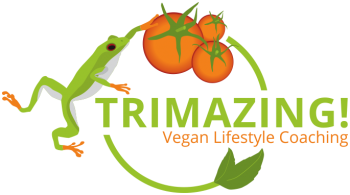 About the Writer:
About the Writer:
Cindy Thompson is a Main Street Vegan Academy Vegan Lifestyle Coach and Educator; an American Council on Exercise certified Health Coach, Peer Fitness Trainer, and Fitness Nutrition Specialist; and Soil and Water Steward for Tilth Alliance in Seattle, WA. Recently retired from a 20-year firefighting career, she has a MS in Leadership, specializing in Servant Leadership. She provides health and lifestyle coaching at Trimazing! Vegan Lifestyle & Health Coaching (https://trimazing.com/). Find her on Facebook (https://www.facebook.com/Trimazing/) and follow on Instagram @TrimazingVLC. Cindy can be reached at [email protected].

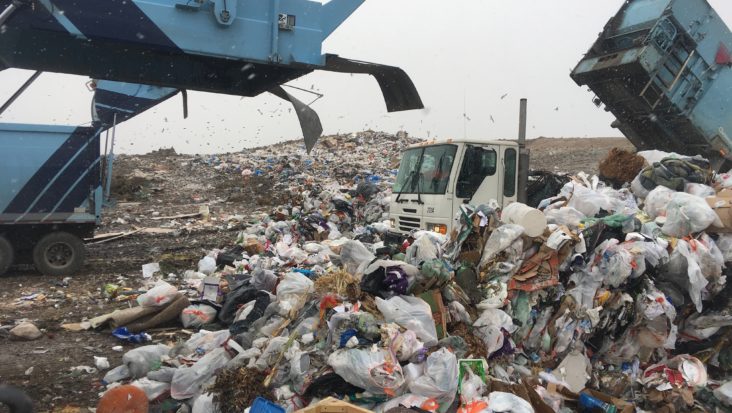
Fabulous post!! So important. When I co-produced the Hudson Valley Vegfest last year, we were hell bent on being zero waste. We hired a company called Zero to Go and when the 2 day event was over (and almost 3000 people walked through) we had two garbage bags to take out. Two! We were amazed, and so were the attendees, who were learning about zero waste as they threw out their disposables.
That’s so inspiring, Sande!
That’s wonderful! Zero waste does take planning and I’m so glad to hear that you had a resource to help you with large event planning. I’m sure you did some work with the vendors to bring zero waste alternatives for their food demos?
Love this article! Thank you Cindy for bringing more awareness to Zero-Waste. I’m doing my best to think of the R’s in my daily life, and love to see tips and encouragement like this!
You’re so welcome! I will have more posts digging deeper in the R’s and practical tips for moving toward zero waste.
Thank you, Cindy, for an eye-opening post and for doing your part to heal the planet. I’m so grateful NYC has compost drop-off sites and that there are compostable garbage bags for the things I can’t compost. My biggest challenge is zero packaging at the grocery store, but I’m working on it!
You’re welcome, Alice. Grocery stores can be a struggle for zero waste, that’s for sure. Kroger just announced last week they are phasing out plastic shopping bags at all of their stores, including Fred Meyer, QFC, and will be 100% plastic shopping bag-free nationwide by 2025 (see https://www.seattletimes.com/business/kroger-to-phase-out-plastic-bags-at-all-stores/?utm_source=marketingcloud&utm_medium=email&utm_campaign=Evening+Brief+08-23-18+opt-in+-+20180823_184338_8_23_2018&utm_term=Active%20subscriber). There is so much other plastic packaging in grocery stores to be addressed. I suggest bringing reusable mesh bags to purchase loose produce in and using your own containers to buy things from bulk, if you can find a grocery store with that available. Here is a good resource for finding bulk grocery shopping near you: https://www.litterless.com/wheretoshop/
Aspirational! Motivating! Thank you, Cindy!!!!!
great post
Thank you for this post. I’ve been a committed vegan for three years, but only recently have I become aware of the zero waste movement and the synchronicity with a vegan lifestyle. Thanks so much for your article, and for bringing this concept to other vegans.